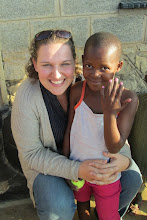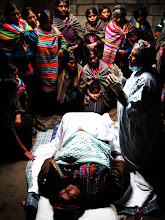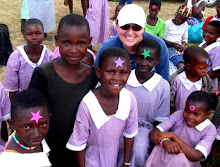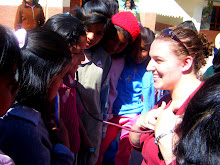The most incredible thing happens when you join the Peace Corps and move to a new country: You find yourself absolutely helpless. Seriously. You don't know ANYTHING. All those years of travelling around the world or living independently, suddenly boil down to nothing on your first night in a rondaval in remote Lesotho. You don't know the language, culture, or even your own name! You NEED others, like you never have before. You are forced to ask for help EVERY day. You find yourself forced to trust strangers who offers a ride, a meal, or a warm place to shelter in the rain. Your Basotho friends and family become your ambassadors to a world you don't understand, translating and explaining the delicate nuances of what's happening around you.
It's often frightening, and even disarming. You feel exposed. Reliant. Yet oddly more inter-connected than ever before. You realize the importance of community. I felt thankful, grateful, and humbled EVERY single day by the kindness of people who had little to give, but would willingly share whatever they had with me. It's an experience which has, without a doubt, made me a more compassionate, thankful, and giving person.
2. Kids are kids... No matter the culture, country, or language.
My kids were my solace and sanctuary during my time in Lesotho... Because, often unlike the adults around me, they didn't judge or stereotype me. They didn't see a white, rich, or strangely unwed woman. They didn't harbour any jealousy for my belongings, or talk about me, right in front of me, in Sesotho. They loved and were delighted by me; unafraid to approach my house or speak English with me. Their innocence was my blessing. They were my teachers, who never became embarrassed or silenced in the wake of my never-ending questions and curiosities. They were by my side through every day; my cure to every temporary bout of loneliness or isolation. They gave me a purpose to be here.
And they are just kids... People who see my photos might see dirty bare-feet or black skin. I see Mookho, Nthatisi, Lerato, Mantletse, Makoro, Katleho, Mokhalaka, Tumello, Thabang, Rappelang, and Tukiso. I see individuals. Funny, brilliant, quirky, unique, little human beings. They didn't stereotype me, and I won't contribute to treating them like pawns in some international aid campaign. They aren't sad or to be pitied. They have wonderful, beautiful, happy lives living in a proud and peaceful country. Yes, they face incredible challenges, many of which are unjust and disproportionally common in Lesotho. They may have the deck stacked against them, but they are not weak, helpless, or needy. They are funny, beautiful, and innocent... Kids are just kids. :)
It's ironic that the most rewarding part of my Peace Corps service has also been the most challenging: my cross-cultural friendships. Without a doubt, they have been both difficult and transformative for me. This is the hard stuff, people... Learning to love and embrace another human being without judgement is perhaps the greatest challenge of our existence. I learned that the hard way during Peace Corps.
Let me provide an example: I think I gained more from my friendship with my colleague, *****, than almost anyone else in Lesotho. I love *****. He was an amazing friend: funny, hilarious, and always there when I needed him. He also happens to be the person who tormented me the most with sexual advances, beat my students relentlessly, and firmly believes that his wife is his property because he paid labola for her ( I believe he used an example about buying a dog when he explained this to me the first time.) This belief was also the defense he gave when he admitted that he'd once raped his wife, when she denied him sex. Apparently, he had the right to do this.... After all, she's his property, right?
4. Culture is powerful.
Before coming to Lesotho, I naively believed that my Masters degree in Anthropology meant that I knew something about culture. I thought I had a healthy dose of respect for the power and influence of culture on human beings. I had no idea.
Culture is powerful; there's simply no other way to say it that plainly. Part of what gives it it's power, is that NO ONE (even little Miss-Oxford-educated-me) is immune to it's effects, and it's roots and influences are often difficult (if not entirely impossible) to discern... Or at least, they're difficult to discern until you put two belief systems, worldviews, and customs side-by-side and compare them. That is EXACTLY what the last two years have done for me. I've learned just as much (if not more) about my own culture, beliefs, and prejudices, as I have about Basotho's.
People often look at culture, and they fixate on the obvious external differences: song and dance, language, or modes of dress. The last two years have taught me that these differences are NOTHING compared to the more subtle, yet deeply ingrained differences in social cues, relationships, belief systems, morals/values, and worldviews. I can't even begin to describe the magnitude of these differences... They are powerful and always present. It's the way people express their emotions, or harbour gendered expectations. It's how we perceive the actions of others and respond to them in kind.
I feel proud that I have lived amongst a traditional Basotho community. I immersed myself in Basotho culture; I adopted their dress, language, and customs, as much as possible. I participated in rites-of-passage, holidays, and community events. I quietly accepted customs or habits (like adultery, domestic abuse, or animal abuse) that I often considered personally immoral. I did all of this out of respect for this culture. I was just about as integrated as it was possible to be... And my investment was rewarded with acceptance from the community. Ha Selomo was truly my home for two years; I loved my village and community. I felt safe and protected there. My presence eventually became more than accepted; it was expected. My absence will be noted.
Yet even after two years as a member of a Basotho community, I have to admit a difficult truth to myself... This will NEVER be my culture. It simply never could be. I could live here for 20 years, marry a Mosotho, speak Sesotho fluently, and raise children in this country. I would still, in some sense, be set apart. I am not Mosotho. I dress, act and speak the part, out of respect to a culture that I desire to honor and live within. Yet it is not MY culture. I think the curtains my host mother bought for her house are ostentatious and ugly; I hold my tongue because I understand that's a culturally-defined sense of beauty. I find the presence of a full marching band at a funeral disrespectful and rude; I dance right alongside bo-'Me to the grave-site because I understand they perceive this celebratory music as a great honour to the departed. I listen to my colleague proudly detail how much her new husband paid in labola (brideprice) for her; I congratulate her because I understand that those 6 cows and 4 sheep are an important part of her sense of self-worth as a woman.
It's not my culture, but I respect it all the same. I respect culture too much to pretend it's a hat I can slip in and out of at will... I am a white, American, middle-class woman. I can't change that, and I wouldn't want to. I can, however, strive to understand how my own culture produces prejudices that could prevent me from clearly seeing other cultures and people for what they are.
5. Stop building infastructure... Start building human capacity.
There were many days when I felt I had to pick my battles in Lesotho. It's yet another infamous Peace Corps myth: the belief that you can change the whole world. News flash to prospective PCVs: you can't and you won't. Accepting that you can't change everything is difficult, but it's absolutely necessary to succeed in development work. You can't fight a war on all fronts.
For me, this has been the essence and purpose of my time in Lesotho. For all my efforts, I can't say I've truly changed much; it's been no more than a tiny ripple in an ocean. Yet I have fulfilled an important role... I have been a witness to the lives of Basotho. I have seen and experienced incredible joys and overwhelming sorrows while in Lesotho. Here I witnessed a different way of life; a new relationship with the world and environment. I feel blessed to have been trusted with the stories of my children. I know this is an incredible gift that was given to me; I had no right to such confidences and histories.
By living with them for two years, I hope that I was able to show my students with my presence and attentive listening, that I value their lives. That I believe that their voices and stories are valuable to the world. If even just for this time, they were heard. I hope I gave them some solace or peace in knowing that someone very far away sees, recognises, and acknowledges their hardships and triumphs. There is value, if even in that.
8. It's not what separates us that matters... It's our similarities, as members of the human race, that are truly powerful.
Love is universal. Motherhood; the unconditional love for a child that you'd sacrifice anything for. Friendship; giggling with your best friend in high school or your first crush on the cute boy that sits behind you in Math class. Family; the sense of belonging you feel coming home after a long trip. Grief; the overwhelming loss of a parent, that shakes your world to the core. Childhood, with all it's joys, laughter, and nagging parents.
We aren't so different. The way we express, celebrate, and sometimes experience these things may be unique, but there is a core of the human experience which is beautifully similar. We have so much in common with each other. Yet sometimes we forget this. Instead, we try to compartmentalize and divide. We use labels like "us" and "them." This leads to stereotypes and judgement.
9. The purpose of my life isn't to be happy or healthy or smart or rich... The purpose of my life is to live with grace.
"Live with grace. Live with grace. Live with grace." This has been my mantra throughout my time in Lesotho. These were the words I whispered to myself through difficult or challenging moments. Occasionally, it was a desperate prayer or sometimes just a meditative thought... I've been captivated by the concept of "grace" during my Peace Corps Service.
I think it's because I realised early on that it was the single word that captured my entire purpose for coming to Lesotho. GRACE. For me, to live with grace is not to be personally happy or even to make others happy. It's greater than duty or obligation. It can't be bought with money or material comforts. Grace, for me, is living in line with my purpose in the world. If you're religious, you might think of it as living aligned with God's will for your life... As a humanist, I prefer to think of it as living in harmony with other human beings. Living in a way that elevates and glorifies my species, rather than shaming or disappointing it. Grace is me centered; living in connection with the world and environment. It's living consciously, boldly, and without fear or reservation. Grace is me at my kindest and most compassionate. It is my projecting the best of myself into the world, in the hopes of enabling others to live fulfilled lives. Grace is difficult. It escapes me. It is something I often feel I fall short of... But still, I try again to "live with grace."
10. I don't care if people call me naïve... I believe the human species is capable of better.
I'm proud to say that I served my country and the country of Lesotho for two years as a Peace Corps Volunteer. I'm even more proud to say, however, that after two years of working in the development sector in a remote corner of the world, surrounded by abject poverty, I am more of an idealist now than when I stepped off the plane 26 months ago.
I believe in hope.
I refuse to look at the world and accept that a species that has unfurled the human genome and explored the heavens is incapable of equality, prosperity, justice, and peace for all peoples on earth. Anything less is beneath us as a human race. I won't accept it.
I hope you won't either.






















